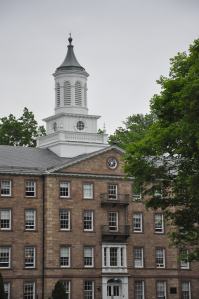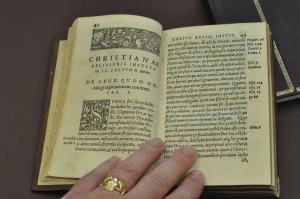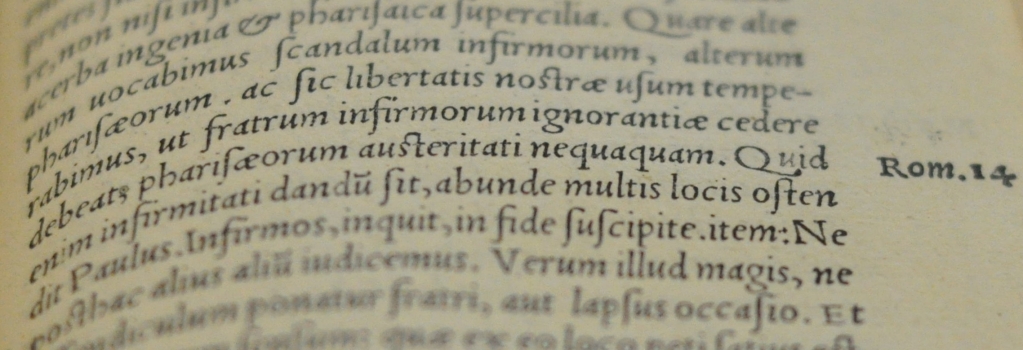“Don’t Panic” said the cover of the Hitchhiker’s Guide to the Galaxy. I’m trying to remember that advice as I work on writing my paper for the Geneva Conference to be delivered bright and early on Wednesday morning, May 27. The fact that most people won’t be fully awake at that hour might give me some comfort, but apart from that, the fact that I have a mere three weeks before delivering the paper causes more than a few waves of panic in my heart. There is so much I need to read, digest, analyze, and translate…way too much. I need to relax, take a deep breath, and just start writing the main outlines of the paper, and fill in the blanks as I go along. My natural tendency toward perfectionism stands in the way of this method, but I have no other choice. Time is short. In fact, I really should be delivering a copy of my finished paper to the chair of the session by next Wednesday. Fat chance!
In any case, once begun is half done, so said someone. Someone who had no clue. Someone who obviously wasn’t an academic, because once one starts to research a topic, all sorts of information comes to the fore which one can then chase down, and that’s exactly what curious scholars like to do. I have no time to do that, so I have to force myself to leave those curious and inviting trails unexplored for the moment.
I have discovered a few things. One, that I can’t read Latin worth a hoot anymore, not that I ever could. It took me an entire day to read 350 words of Latin. Not only that, but I was reading it from a sermon that I said, in an article published some years ago, didn’t exist. It’s a very interesting sermon by Calvin on I Samuel 16. In verses 1-2, God tells Samuel to go and anoint David king over Israel instead of Saul. Samuel objects that Saul will kill him. The Lord says, tell him you’re going away to make a sacrifice. In other words, mislead Saul about what you are going to do. Or at least, don’t tell Saul the whole truth. I always wondered how Calvin would deal with that passage, and I wrote in an article that he never did…oops…he preached on this text, but I forgot about these particular sermons, in part because they were never translated into English, while the sermons on II Samuel were. There’s a lot of interesting stuff in this little snippet from the sermon, many fascinating, unexplored trails, but I have to stay on the main path: How does Calvin deal with acts of deception in the Old Testament–and even more challenging: how does he deal with apparent instances of God himself either deceiving or commanding someone to deceive?
Here’s the snippet:
“But here another question may be raised: How can God either command or permit the prophet to employ a charade (simulatio)? For certainly such pretense is a form of deception; yet God is most delighted in the truth. Should such pretending be seen as a trivial matter, given that God has permitted it? Here is the answer: Samuel was never given permission to lie, but only to dissimulate about what he wanted to do, but while still speaking the truth. And besides, there is a distinction between feigning and dissimulating. For the one who dissimulates conceals his purpose so it does not become public, whereas the one who feigns employs trickery and fraud in order to deceive someone, and this is not permitted to anyone. Dissimulation, on the other hand, that is, not revealing one’s intentions in full, can neither be condemned nor categorized as wrongdoing—unless of course the intention of such dissimulation is to deceive, in which case it is always to be censured. Neither is God taken in by such subtleties that so easily fool human beings. For this reason the dissimulator cannot be condemned in the human arena, although before God he may be guilty of deception, if his intention is to mislead. For example, if someone withholds information about his merchandise, namely that his goods are fake and counterfeit, he nonetheless cannot be proven guilty of deception, nor accused of having misrepresented one thing as something else—unless however he is dealing with a simple-minded person, who is unable to perceive the defect in the merchandise. In that case it is fraud, and before God it is considered an act of robbery. Thus we must always keep in mind the goal of one’s deliberations, and not get so stuck on the external appearance; and we should not employ sneakiness or subtleties, in which people in their wickedness have become accomplished experts, because they have no notion of what just and good; and God wants matters to be rightly judged according to what is fair and good, not by what is cunning and crafty.
Now then we must also consider what Samuel did. It is to be observed that he did not feign, but declared what was in fact the case: that he was going in order to make a sacrifice. Further, he did not mislead anyone, or deceive anyone; he did not use any sinister tricks, but submitted to God’s command. For it was not necessary for God’s purpose to be publically proclaimed, since for the time being God wished to keep it hidden. He desired that David’s anointing remain secret until the appropriate time when it should be made public. For this reason there is nothing reprehensible in the counsel that he followed that he should conceal the anointing under the pretext of a sacrifice, seeing that there was no deception behind it, and the end was good, nor did it amount to any fraud or deception. Rather God willed that the anointing of David be kept as a kind of secret deposit, as it were, and a kind of pledge to be diligently guarded. That, therefore, was the Lord’s counsel with respect to the anointing of David, which he accordingly did not want divulged by the prophet, but rather commanded to be concealed under the pretext of a sacrifice.” Sermon 58 on I Samuel, Opera Calvini 30:161-162, my translation, subject to improvement.
 Sandy attended the Conference on Emerging Adulthood at Princeton Theological Seminary this past weekend. At the time of this writing (Monday morning) she is still trying to get back home, thanks to mechanical troubles with her plane. I met her up there, and while she was conferencing, I enjoyed Princeton’s considerable beauty, history, and library treasures. Princeton’s campus is a thing of beauty, especially if you love big old fancy buildings. There was also a great bookstore, called Labyrinth Books, on the main drag near the University, Nassau Street.
Sandy attended the Conference on Emerging Adulthood at Princeton Theological Seminary this past weekend. At the time of this writing (Monday morning) she is still trying to get back home, thanks to mechanical troubles with her plane. I met her up there, and while she was conferencing, I enjoyed Princeton’s considerable beauty, history, and library treasures. Princeton’s campus is a thing of beauty, especially if you love big old fancy buildings. There was also a great bookstore, called Labyrinth Books, on the main drag near the University, Nassau Street.


